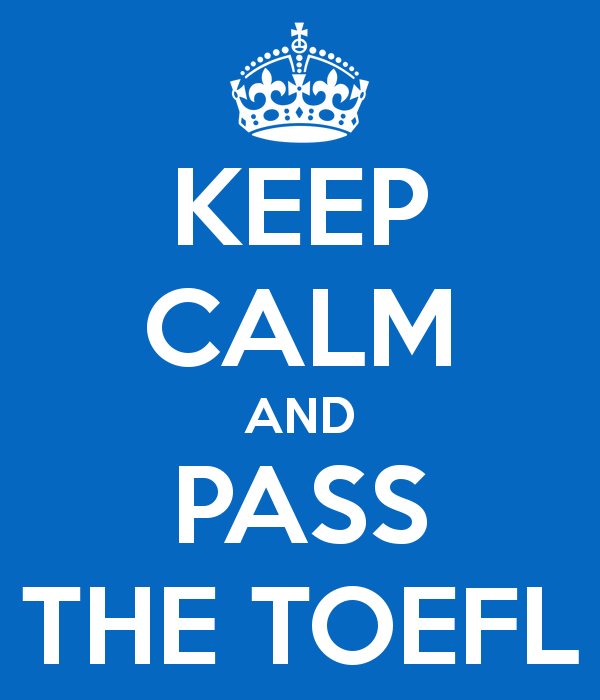Preparing for the TOEFL
Have you got a TOEFL test coming up and it’s keeping you awake at night? For most people, the mere thought of taking an exam in English can be very daunting and stressful. The good news is that with time, study and commitment, preparing for the TOEFL doesn’t have to be such a nightmare. Of course it has to be said that you need to have a certain level of English to start with, and if you don’t, you should start improving your general English with a native English teacher. Once you are ready, there are certain strategies to help you in preparing for the TOEFL. Follow this guide to get ready and feel confident on the day of your test.
Preparing for the TOEFL by understanding the exam
 Like you, many students are choosing to study abroad and need a TOEFL score. The test measures your English speaking, listening, reading and writing skills, and your ability to successfully complete a course at an English-speaking college or university. So first, find out what score you need to get into your ideal school or institution and make that score your goal. Come up with a study plan and decide how much time you are going to need before your exam.
Like you, many students are choosing to study abroad and need a TOEFL score. The test measures your English speaking, listening, reading and writing skills, and your ability to successfully complete a course at an English-speaking college or university. So first, find out what score you need to get into your ideal school or institution and make that score your goal. Come up with a study plan and decide how much time you are going to need before your exam.
Next, you need to understand how the TOEFL works (https://www.ets.org/toefl) and what is expected of you. For example, did you know that you can take the TOEFL test by computer as well as paper? If you take the internet-based test, you will have to type your answers and your essay on the computer, so you need to feel confident typing on a QWERTY keyboard, with both hands preferably. Upon taking the test, there should be no surprises – you should already feel confident that you know how to tackle every type of question. To do this, try a full practice test to see which skill areas you need to dedicate more study time to. Finally, a professional native English instructor who knows how to teach TOEFL is going to be your best resource because they can guide you on the best way to study and provide you with the study materials you need for this exam.
How to prepare for the TOEFL speaking section
The speaking section of the TOEFL consists of two independent and four integrated speaking tasks. In the two  independent tasks you will answer opinion questions on different familiar topics and be evaluated on your spontaneous speech and ability to convey your ideas clearly and coherently. In the integrated tasks you will be judged on your ability to appropriately respond to things you have heard and read. Although you will be allowed a short preparation time (about 15 seconds) before you start speaking and you can use notes to help prepare your responses, it is essential to practice this part at home with a timer.
independent tasks you will answer opinion questions on different familiar topics and be evaluated on your spontaneous speech and ability to convey your ideas clearly and coherently. In the integrated tasks you will be judged on your ability to appropriately respond to things you have heard and read. Although you will be allowed a short preparation time (about 15 seconds) before you start speaking and you can use notes to help prepare your responses, it is essential to practice this part at home with a timer.
Preparing for the TOEFL speaking section with a native English teacher listen to you while you speak and giving you their opinion of your performance with suggestions for improvement is invaluable. If this is not possible, you could try recording yourself and then doing a self evaluation. A good general activity to prepare is to choose a different topic every day and start speaking about it out loud for a few minutes. Without writing down any notes. While you speak, record it and then listen to your own recording to check whether your voice is clear and fluency is there or not.
Preparing for the TOEFL listening section
Now it’s time to tackle the listening part of the TOEFL, which includes six listening passages of approximately 3–5 minutes long each. The listening texts can include student conversations, academic discussions or lectures. Each conversation and lecture passage is heard only once, so when you are preparing for it, avoid playing the listening more than once so that you train your ears to concentrate and listen fully the first time itself. You may also take notes while you listen and refer to your notes when you answer the questions, so don’t forget to practice how to take notes while listening so that you remember what was being said.
The listening questions are there to assess your ability to understand what the main ideas and important details are, how information is organised, the relationships between ideas and the purpose and attitude of the speakers. It is important to listen and train yourself for these different question types. Besides TOEFL-focused materials, you should train by watching television and movies to get familiar with different English accents. International news reports from English-speaking countries will provide high quality vocabulary on a number of issues as well as help you get accustomed to hearing all-English segments.
How to prepare for the reading section
This section contains 3-5 passages with questions that test your understanding of the text and the strength of your vocabulary. The passages are based on academic topics and require understanding of theoretical functions like cause and effect, comparing and contrasting and forms of argumentation.
In the days you have scheduled to prepare for reading with practice tests, you should develop your reading skills like skimming (reading quickly) through a text and trying to grasp the main idea of the passage without having to read it thoroughly. Always take notes while you skim through the passages so that you know where to find the answer.
In general, make reading a habit by reading regularly, especially topics like social sciences, business, science and arts. Read from multiple resources including textbooks, journals, encyclopedias and advertisements. Major media newspapers, websites and science magazines are good sources of such material and they also cover topics that could pop up on test day. It is also highly recommended to read texts in English to simply train your eyes to recognize the structure of passages dealing with a variety of topics.
Preparing for the TOEFL writing section
The writing test lasts for fifty minutes and consists of two tasks; for one task, you write independently for thirty minutes to support an opinion on a topic. The second task involves writing a response to something you have heard and read within twenty minutes. As previously mentioned, if you are taking the computer test you should be confident with typing and being able to write for a long time on the computer.
Another important note about how to prepare for the TOEFL writing section is that it’s essential to draw up an outline or plan before you start writing your essay. This will save you a lot of time in your test because you will not be struggling for ideas. When you make your essay plan, make sure you have an introduction and conclusion and that your main ideas are separated into paragraphs. Practicing drawing up plans and structuring your essay during your study time will help you to do this quickly on test day.
For general writing practice, choose a different topic to write about every day. Learn how to express your opinion on particular topics while giving reasons to back up your ideas.
Get ready to take the exam
So now that you know how to prepare for the TOEFL, what do you do when the big day arrives? On the day before your test, try to avoid any challenging material and just go for a light read in English or watch a few news segments. Do try to rest, because the TOEFL is a long and demanding experience.
On testing day, dress comfortably and eat well before going to the test center and make sure to take enough water and some snacks with you to boost your energy in the break between Listening and Speaking. Arrive on the test centre before time on the day of exam so that you have time to relax and be comfortable with the exam setting. During the test and if you have time, answer all of the questions. If you don’t know the answer to a particular question, guess! There is no negative marking so in some sections 25% of your guessed questions could be correct. But most of all, breathe and relax. Good luck!








